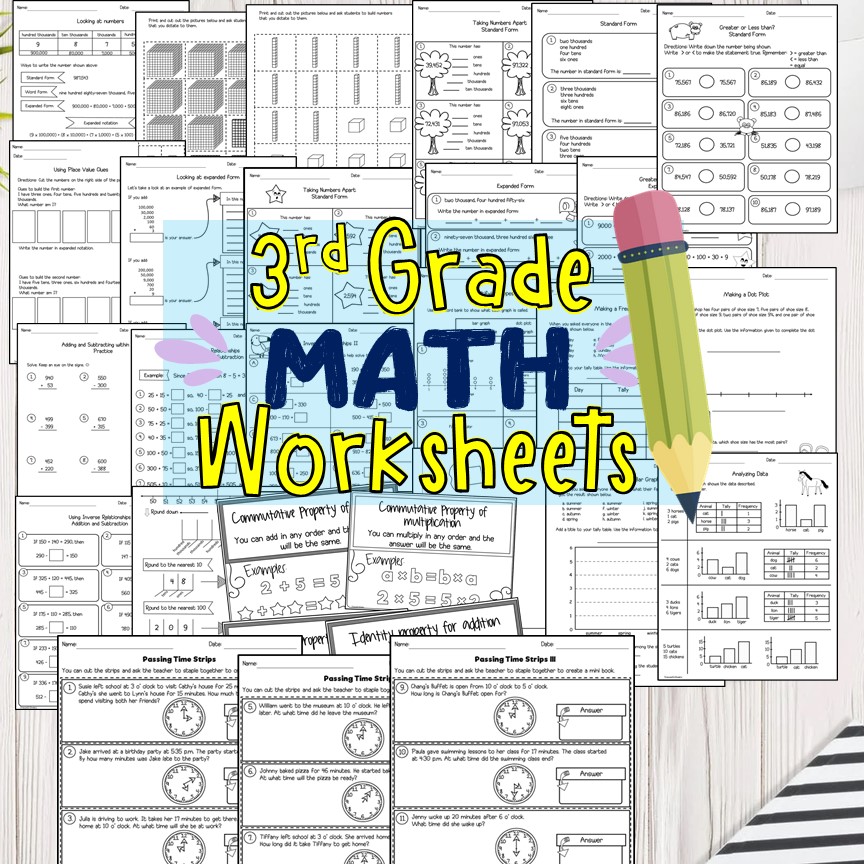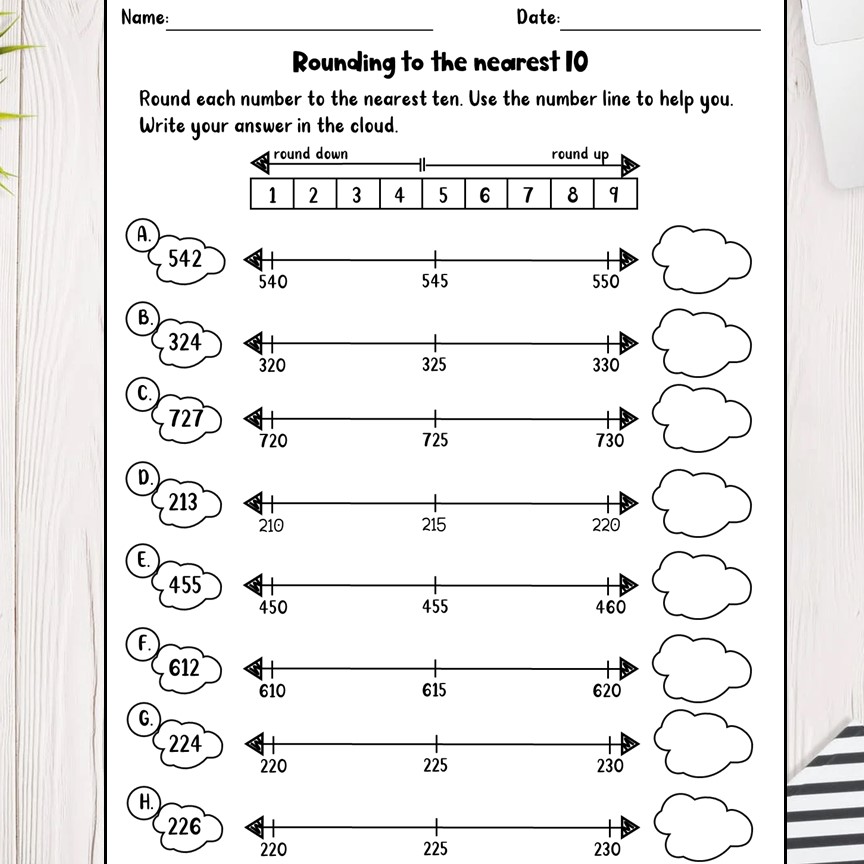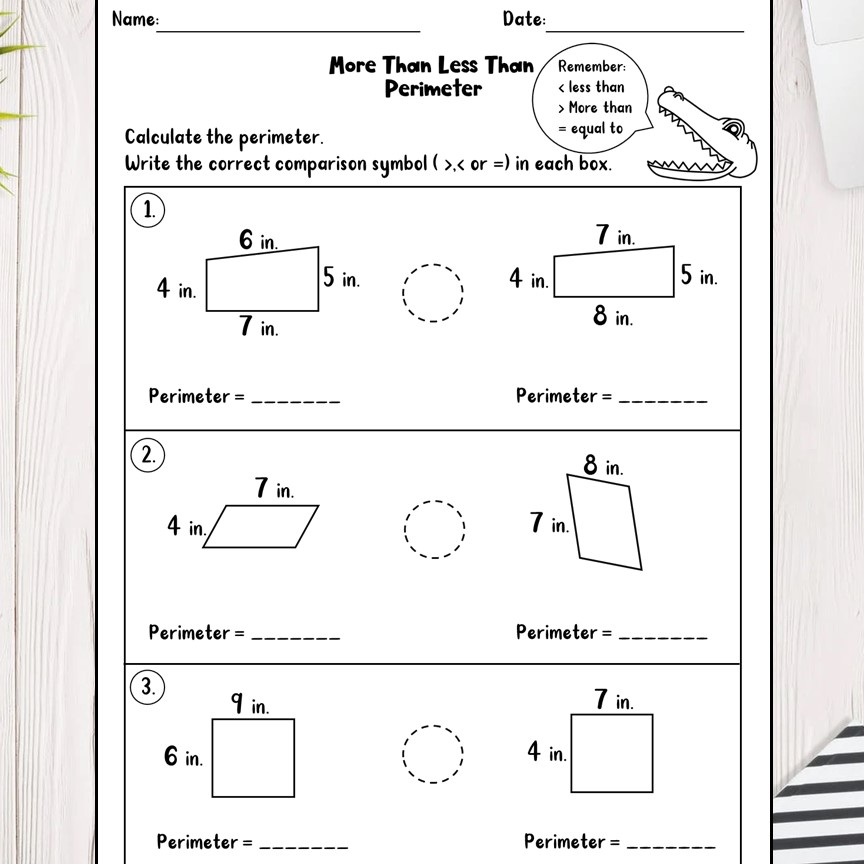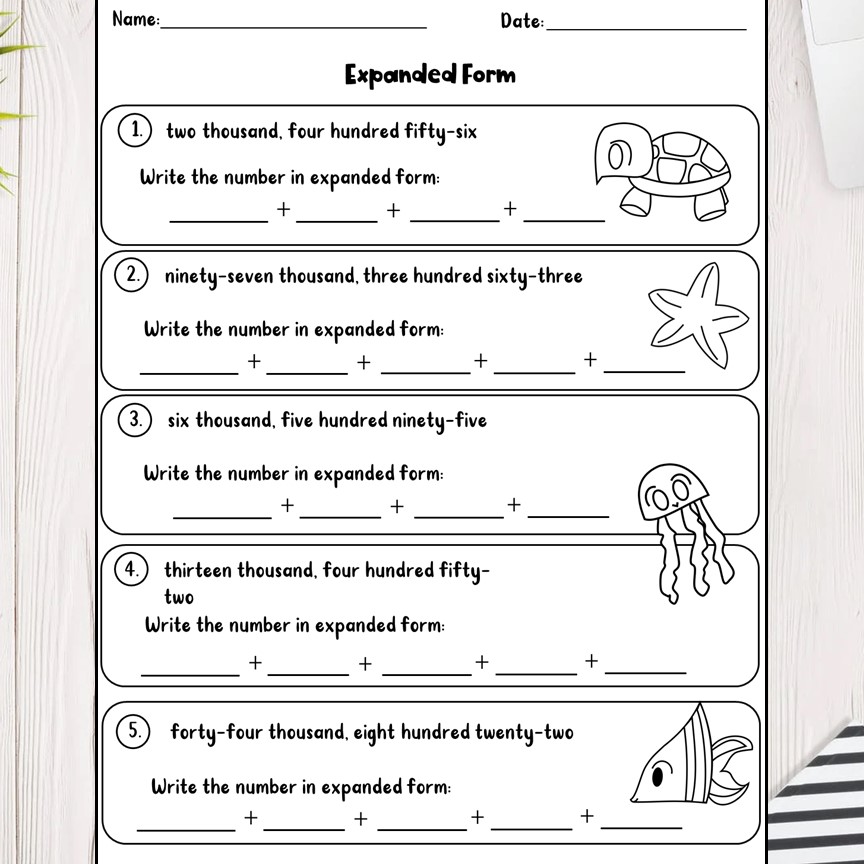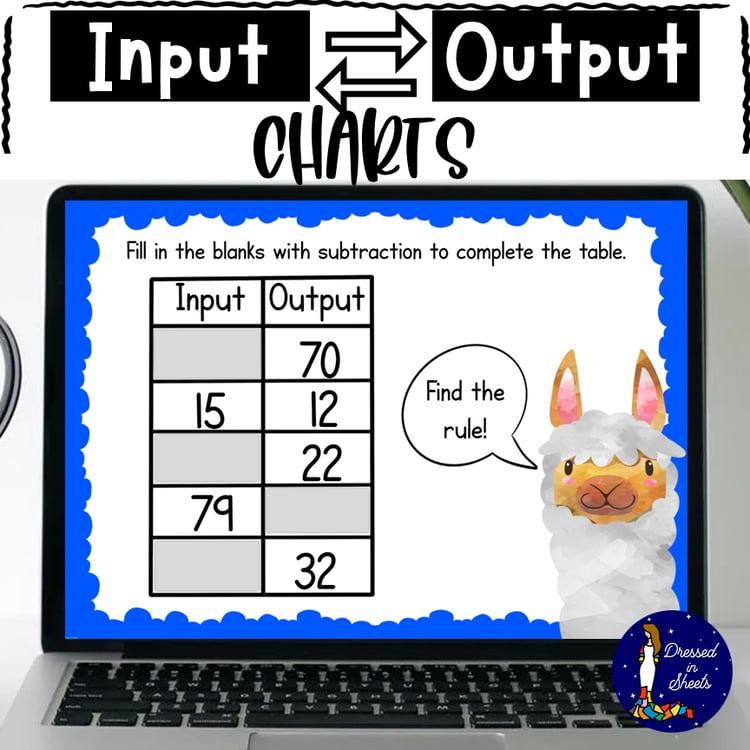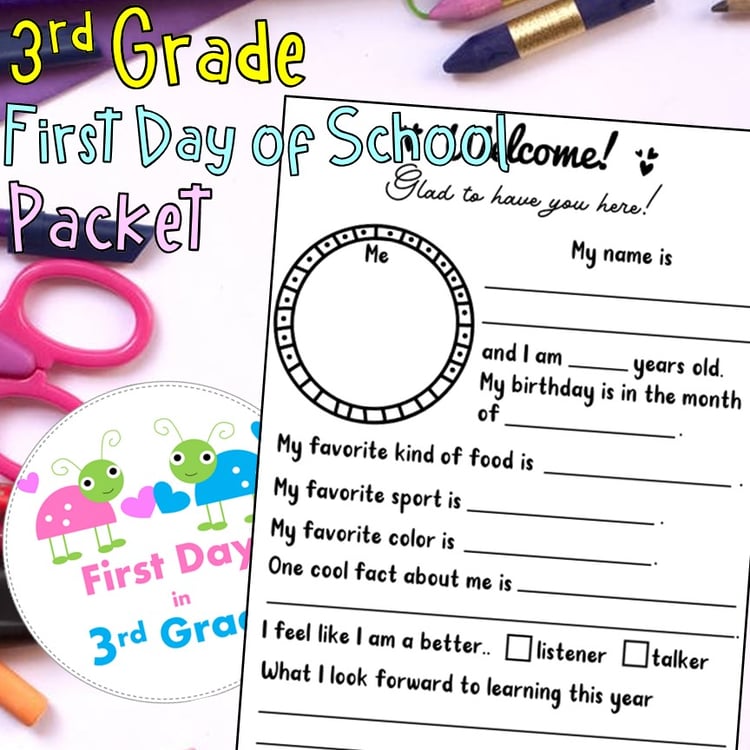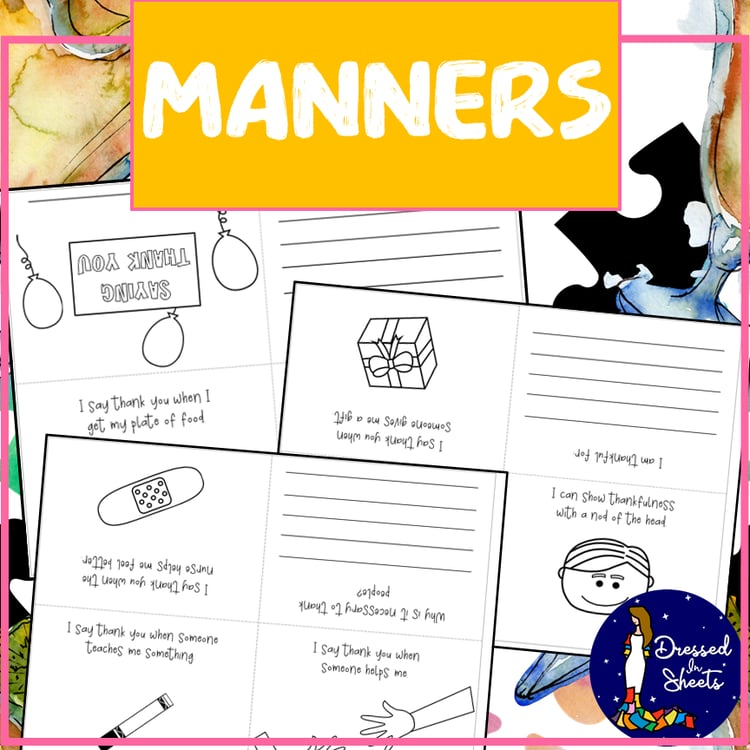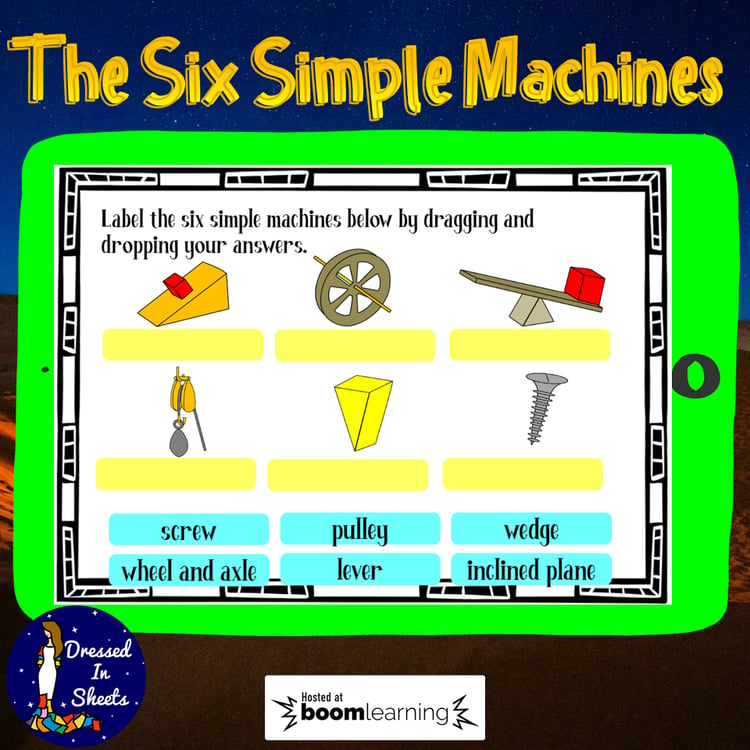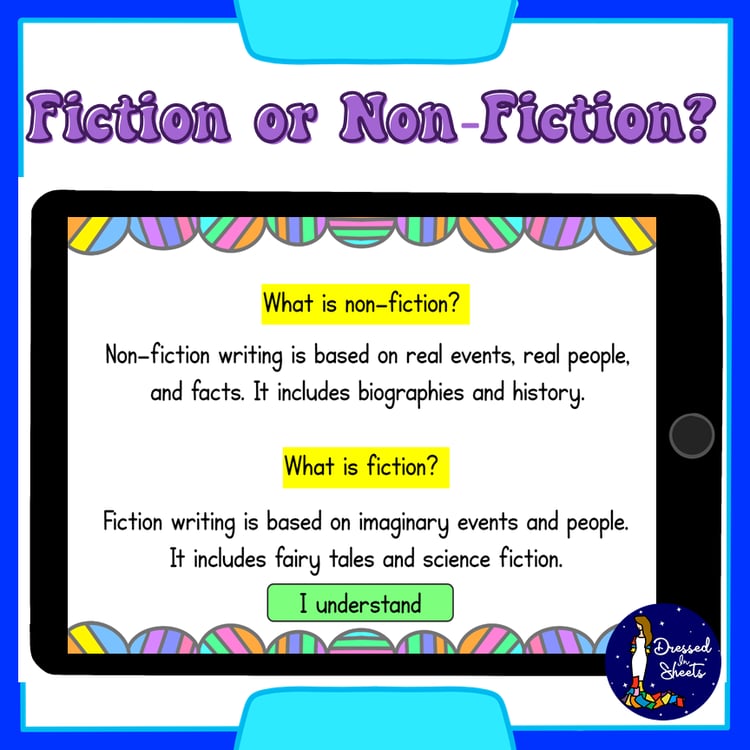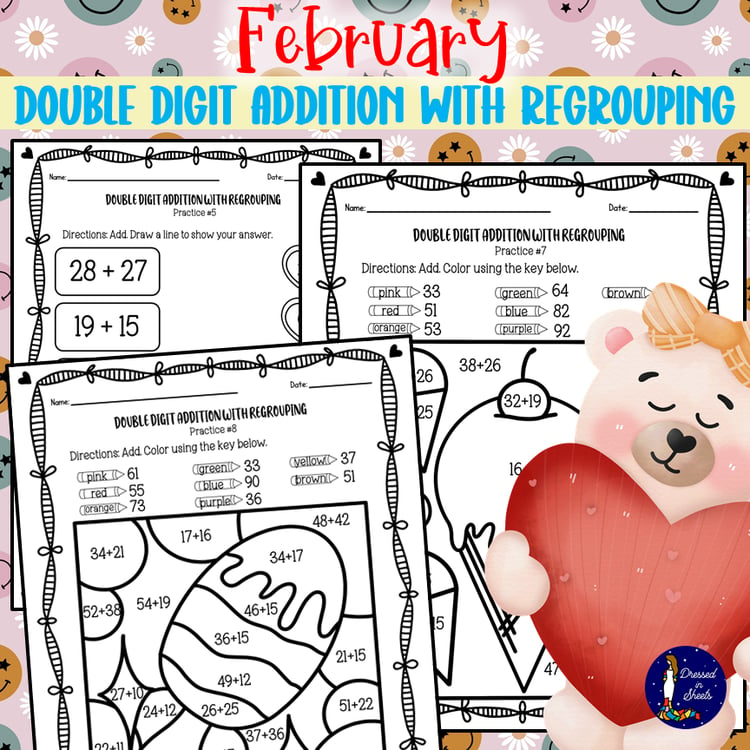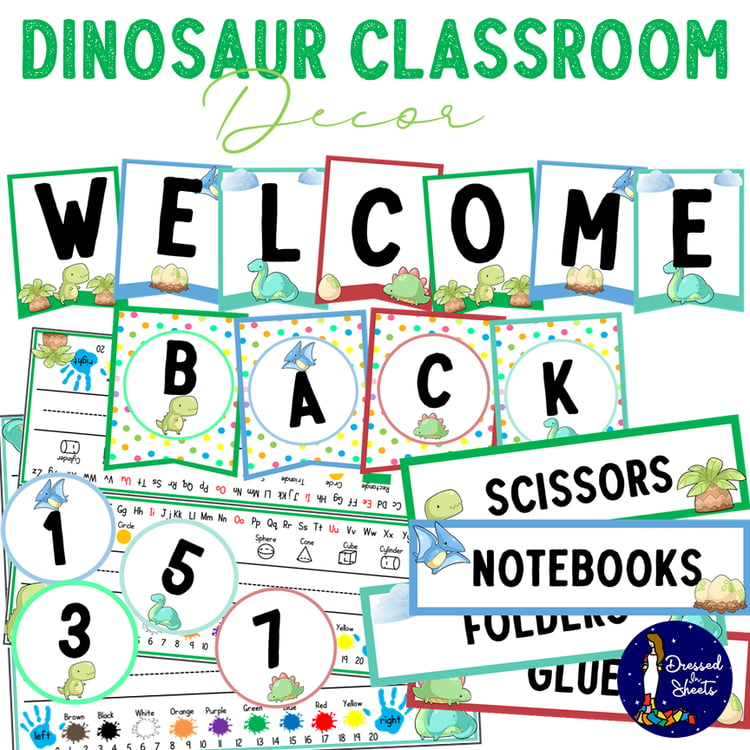3rd Grade Math Worksheets PDF
On Sale
$10.00
$10.00
3rd Grade Math Worksheets PDF file which consists of 10 units. Ideas for the worksheets in this resource include: independent math work packets, work book, homework, busy work, and supplement for lesson plans in a guided curriculum. Includes around 400 pages of varying activities and a small fraction of those may require the use of glue, scissors, and colors. Each unit has its very own cover followed by a contents page that shows which TEKS standards are being covered in that specific unit.
What each unit will cover:
✅Unit 1: 3.2A – Compose and decompose numbers up to 100,000 as a sum of so many ten thousands, so many hundreds, so many tens, and so many ones using objects, pictorial models, and numbers, including expanded notations as appropiate.
3.2D – Compare and order whole numbers up to 100,000 and represent comparisons using the symbols
✅Answer key
✅Unit 2: 3.4A – Solve with fluency one-step and two-step problems involving addition and subtraction within 1,000 using strategies based on place value, properties of operations, and the relationship between addition and subtraction.
3.4B – Round to the nearest 10 or 100 or use compatible numbers to estimate solutions to addition and subtraction problems.
✅Answer key
✅Unit 3: 3.8A – Summarize a data set with multiple categories using a frequency table, dot plot, pictograph, or bar graph with scaled intervals.
3.8B – Solve one and two-step problems using categorical data represented with a frequency table, dot plot, pictograph, or bar graph with scaled intervals.
✅Answer key
✅Unit 4: 3.4D – Determine the total number of objects when equally-sized groups of objects are combined or arranged in arrays up to 10 by 10.
3.4E – Represent multiplication facts by using a variety of approaches such as repeated addition, equal-sized groups of objects are combined or arranged in arrays up 10 by 10.
3.4F – Recall facts to multiply up to 10 by 10 with automaticity and recall the corresponding division facts.
3.4H – Determine the number of objects in each group when a set of objects is partitioned into equal shares or a set of objects is shared equally.
3.4I – Determine if a number is even or odd using divisibility rules.
3.4J – Determine a quotient using the relationship between multiplication and division.
3.5D – Determine the unknown whole number in a multiplication or division equation relating three whole numbers when the unknown is either a missing factor or product.
✅Answer key
✅Unit 5: 3.4G – Use strategies and algorithms, including the standard algorithm, to multiply a two digit number by a one digit number. Strategies may include mental math, partial products, and the commutative, associative, and distributed properties.
3.4K – Solve one-step and two-step problems involving multiplication and division within 100 using strategies based on objects; pictorial models, including arrays, area models, and equal groups; properties of operations; or recall of facts.
✅Answer key
✅Unit 6: 3.6A – Classify and sort two- and three-dimensional solids, including cones, cylinders, spheres, triangular and rectangular prisms, and cubes, based on atributes using formal geometric language.
3.6B – Use atributes to recognize rhombuses, parallelograms, trapezoids, rectangles, and squares as examples of quadrilaterals and draw examples of quadrilaterals that do not belong to any of these subcategories.
✅Answer key
✅Unit 7: 3.6C – Determine the area of rectangles with whole number side lenghts in problems using multiplication related to the number of rows times the number of unit squares in each row.
3.7B – Determine the perimeter of a polygon or a missing lenght when given perimeter and remaining side lenghts in problems
✅Answer key
✅Unit 8: 3.3A – Represent fractions greater than zero and less than or equal to one with denominators of 2, 3, 4, 6, and 8 using concrete objects and pictorial models, including strip diagrams and number lines.
3.3B – Determine the corresponding fraction greater than zero and less than or equal to one with denominators of 2,3,4,6, and 8 given a specified point on a number line.
3.3C – Explain that the unit fraction 1/b represents the quantity formed by one part of a whole that has been partitioned into b equal parts where b is a non-zero whole number.
3.3D – Solve problems involving partitioning an object or a set of objects among two or more recipients using pictorial representations of fractions with denominators of 2, 3, 4, 6, and 8.
3.7A – Represent fractions of halves, fourths, and eighths as distances from zero on a number line.
✅Answer key
✅Unit 9: 3.7C – Determine the solutions to problems involving addition and subtraction of time intervals in minutes, using pictorial models or tools such as a 15-minute event plus a 30-minute event equals 45 minutes.
✅Answer key
✅Unit 9: 3.2A – Compose and decompose numbers up to 100,000 as a sum of so many ten thousands, so many hundreds, so many tens, and so many ones using objects, pictorial models, and numbers, including expanded notations as appropiate.
3.2D – Compare and order whole numbers up to 100,000 and represent comparisons using the symbols.
✅Answer key
There is a lot of worksheets in this resource and therefore it is difficult to list in detail the activities since it would take FOREVER! So, I've listed the standards which they align to. As stated prior all units will have the information on the contents page of each unit.
Have fun going through this treasure trove of information! I hope you enjoy and your classroom enjoy this HUGE resource.
Total 300+ pages.
What each unit will cover:
✅Unit 1: 3.2A – Compose and decompose numbers up to 100,000 as a sum of so many ten thousands, so many hundreds, so many tens, and so many ones using objects, pictorial models, and numbers, including expanded notations as appropiate.
3.2D – Compare and order whole numbers up to 100,000 and represent comparisons using the symbols
✅Answer key
✅Unit 2: 3.4A – Solve with fluency one-step and two-step problems involving addition and subtraction within 1,000 using strategies based on place value, properties of operations, and the relationship between addition and subtraction.
3.4B – Round to the nearest 10 or 100 or use compatible numbers to estimate solutions to addition and subtraction problems.
✅Answer key
✅Unit 3: 3.8A – Summarize a data set with multiple categories using a frequency table, dot plot, pictograph, or bar graph with scaled intervals.
3.8B – Solve one and two-step problems using categorical data represented with a frequency table, dot plot, pictograph, or bar graph with scaled intervals.
✅Answer key
✅Unit 4: 3.4D – Determine the total number of objects when equally-sized groups of objects are combined or arranged in arrays up to 10 by 10.
3.4E – Represent multiplication facts by using a variety of approaches such as repeated addition, equal-sized groups of objects are combined or arranged in arrays up 10 by 10.
3.4F – Recall facts to multiply up to 10 by 10 with automaticity and recall the corresponding division facts.
3.4H – Determine the number of objects in each group when a set of objects is partitioned into equal shares or a set of objects is shared equally.
3.4I – Determine if a number is even or odd using divisibility rules.
3.4J – Determine a quotient using the relationship between multiplication and division.
3.5D – Determine the unknown whole number in a multiplication or division equation relating three whole numbers when the unknown is either a missing factor or product.
✅Answer key
✅Unit 5: 3.4G – Use strategies and algorithms, including the standard algorithm, to multiply a two digit number by a one digit number. Strategies may include mental math, partial products, and the commutative, associative, and distributed properties.
3.4K – Solve one-step and two-step problems involving multiplication and division within 100 using strategies based on objects; pictorial models, including arrays, area models, and equal groups; properties of operations; or recall of facts.
✅Answer key
✅Unit 6: 3.6A – Classify and sort two- and three-dimensional solids, including cones, cylinders, spheres, triangular and rectangular prisms, and cubes, based on atributes using formal geometric language.
3.6B – Use atributes to recognize rhombuses, parallelograms, trapezoids, rectangles, and squares as examples of quadrilaterals and draw examples of quadrilaterals that do not belong to any of these subcategories.
✅Answer key
✅Unit 7: 3.6C – Determine the area of rectangles with whole number side lenghts in problems using multiplication related to the number of rows times the number of unit squares in each row.
3.7B – Determine the perimeter of a polygon or a missing lenght when given perimeter and remaining side lenghts in problems
✅Answer key
✅Unit 8: 3.3A – Represent fractions greater than zero and less than or equal to one with denominators of 2, 3, 4, 6, and 8 using concrete objects and pictorial models, including strip diagrams and number lines.
3.3B – Determine the corresponding fraction greater than zero and less than or equal to one with denominators of 2,3,4,6, and 8 given a specified point on a number line.
3.3C – Explain that the unit fraction 1/b represents the quantity formed by one part of a whole that has been partitioned into b equal parts where b is a non-zero whole number.
3.3D – Solve problems involving partitioning an object or a set of objects among two or more recipients using pictorial representations of fractions with denominators of 2, 3, 4, 6, and 8.
3.7A – Represent fractions of halves, fourths, and eighths as distances from zero on a number line.
✅Answer key
✅Unit 9: 3.7C – Determine the solutions to problems involving addition and subtraction of time intervals in minutes, using pictorial models or tools such as a 15-minute event plus a 30-minute event equals 45 minutes.
✅Answer key
✅Unit 9: 3.2A – Compose and decompose numbers up to 100,000 as a sum of so many ten thousands, so many hundreds, so many tens, and so many ones using objects, pictorial models, and numbers, including expanded notations as appropiate.
3.2D – Compare and order whole numbers up to 100,000 and represent comparisons using the symbols.
✅Answer key
There is a lot of worksheets in this resource and therefore it is difficult to list in detail the activities since it would take FOREVER! So, I've listed the standards which they align to. As stated prior all units will have the information on the contents page of each unit.
Have fun going through this treasure trove of information! I hope you enjoy and your classroom enjoy this HUGE resource.
Total 300+ pages.

